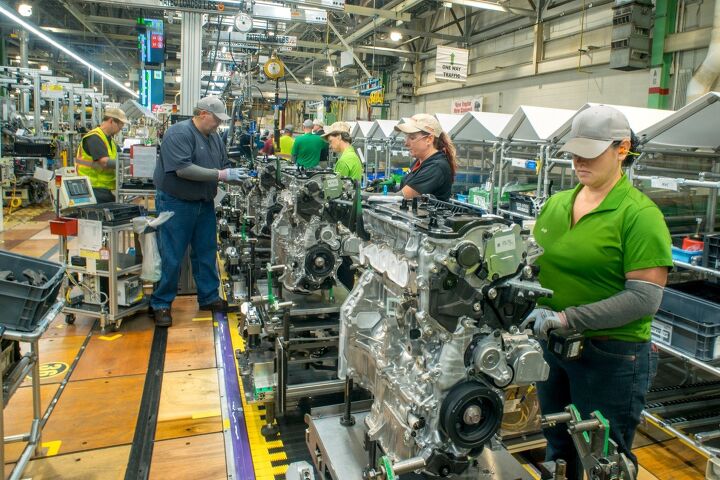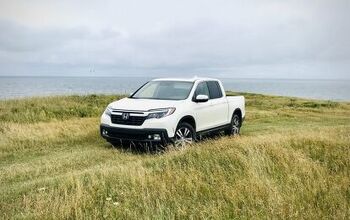Toyota Will Spend $374 Million on Five U.S. Plants - Think Hybrids and Camrys
Toyota announced yesterday that its plans to invest $10 billion in the United States, revealed earlier this year, will grow by another $374 million with big spending at five different factories in five different states.
Kentucky, Tennessee, West Virginia, Alabama, and Missouri will all benefit. Though it’s unlikely the investments will directly translate to much in the way of new employment — Toyota promises 50 new jobs in Alabama — Toyota says “these investments will help to ensure the stability of the plants’ employment levels in the future.”
At the core of the investments? Toyota is spending money to enable greater production of the new TNGA 2018 Toyota Camry’s 2.5-liter engines and hybrid transaxles. Why America? “The investment is part of our long-term commitment to build more vehicles and components in the markets in which we sell them.”
Toyota sells 200,000 vehicles per month in the United States.
Toyota’s Georgetown, Kentucky, facility will receive nearly $121 million in order to expand capacity for 2.5-liter engines.
The Jackson, Tennessee facility will benefit from $14.5 million to “accomodate production of hybrid transaxle cases and houses” plus engine blocks for the 2.5-liter four-cylinder engine.
In Buffalo, West Virginia, $115 million will allow production of hybrid transaxles.
Huntsville, Alabama’s Toyota plant requires $106 million so it can build engines associated with the Toyota New Global Architecture.
In the Toyota plant in Troy, Missouri, $17 million will be invested to facilitate the build of more heads for the 2.5-liter engine.
Much of this supports the plan to build more hybrid vehicles for America. Perceived by some to be an unnecessary stop-gap on the way to a fully electric fleet, Toyota believes in providing customers with the vehicles customers actually want to buy. To date, that has required expansions at pickup truck plants in Texas and Tijuana. But it also entails the building of more vehicles like the Toyota Highlander Hybrid, which Toyota made much more affordable earlier this year.
As a result, Highlander Hybrid sales have tripled to 11,099 units in America this year, according to HybridCars.com. Overall, Toyota and Lexus own 49 percent of the U.S. market for hybrids and plug-in hybrids through 2017’s first eight months.
[Images: Toyota]
Timothy Cain is a contributing analyst at The Truth About Cars and Autofocus.ca and the founder and former editor of GoodCarBadCar.net. Follow on Twitter @timcaincars and Instagram.
More by Timothy Cain
Latest Car Reviews
Read moreLatest Product Reviews
Read moreRecent Comments
- SCE to AUX "Senator, I served with Scion. I knew Scion. Scion was a friend of mine. Senator, you're no Scion."
- Cprescott No, that is not a new car. It is a DEMO. Why are they trying to hide this? (obviously to command a higher transaction price). Demos used to be good deals.
- Kjhkjlhkjhkljh kljhjkhjklhkjh ""On the one hand, selling a car with over 6,000 miles on the clock as “new” seems insane.""add to that people treat loaners and rentals like disposable race cars... hard no. if it has more than 500 miles it is not new.if it has been loaned out to many users it is not new.if you have to monkey the title to call it new, not new.dealerships are the worst. id rather get a root canal through my anus ...
- Cprescott It looks like a Ski-on.
- 1995 SC I've purchased a demo before. So long as everything is disclosed and the "in service" date and mileage are reflected so I get the full warranty I'm good...so long as the discount reflects the mileage.


































Comments
Join the conversation
Good for Huntsville
This is incredibly smart move by Toyota. They are positioning themselves to take over the market after the scourge of SUV/CUV whatever trucklet ends. It appears that Toyota is more American than the big 2.5 now. Huge investments in the USA, huge popularity among Americans. Quintessentially American company with Japanese heritage. At the same time it may be their downfall, too bland, too domestic. Cheap Chinese imports are likely to make a serious dent in Toyota's sales in the coming years.